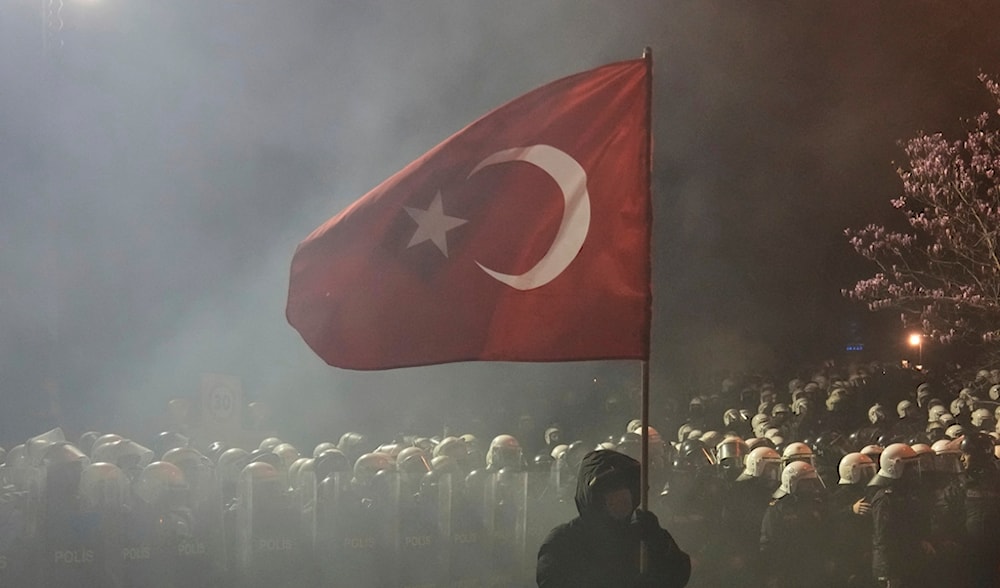Turkish stocks rebound amid Imamoglu’s arrest, short-selling ban
Following last week's plunge, Turkish stock markets have seen a slight improvement following a short-selling ban imposed to maintain financial stability.
-

A protester holds up a Turkish flag during a protest against the arrest of Istanbul's Mayor Ekrem Imamoglu, in Istanbul, Turkey, Saturday, March 22, 2025. (AP)
Turkish stocks rose 3.1% on Monday, recovering some of last week’s steep losses, as the capital markets board imposed a short-selling ban amid rising political tensions following the arrest of Istanbul Mayor Ekrem Imamoglu.
The Borsa Istanbul benchmark index (.XU100) had plummeted 16.6% last week—its worst drop since the 2008 financial crisis—while the banking sub-index (.XBANK) had fallen over 26%. By 08:56 GMT on Monday, the banking sector had gained 3.23%.
A Turkish court on Sunday ordered Imamoglu, President Tayyip Erdogan’s main political rival, to be jailed pending trial on corruption charges. The move triggered the country’s largest protests in more than a decade and drew condemnation from the opposition, European leaders, and hundreds of thousands of demonstrators who view the charges as politically motivated.
The move comes as Imamoglu faces allegations of involvement with a network accused of corruption, bribery, and assisting terrorism. Although a court declined to approve a terrorism-related arrest request, the Istanbul Chief Public Prosecutor's Office plans to challenge that ruling. The final say now rests with the Constitutional Court, local media outlet Sabah reported.
Imamoglu’s detention last Wednesday sent markets into turmoil, causing sharp declines in the lira, stocks, and bonds. Analysts warn of prolonged instability.
“The protests mark the most significant and widespread public reaction in over a decade, making the trajectory of events difficult to predict,” said Wolfango Piccoli of Teneo. “Once again, President Erdogan’s political agenda has inflicted serious damage on Turkey’s economic outlook.”
Attempts to maintain financial stability
In response to market volatility, the capital markets board banned short selling on the Istanbul bourse and eased share buyback limitations and equity ratio requirements until April 25.
Meanwhile, the Turkish lira remained largely unchanged, trading at 37.9550 against the US dollar, compared to Friday’s close of 37.9500. The currency had already fallen 3.5% last week.
The central bank met with banking executives on Sunday, reaffirming its commitment to using “all instruments effectively and decisively” to maintain financial stability.
Turkiye's Central Bank has sold an estimated $26 billion in foreign currency reserves over just three days this week in a bid to stabilize the rapidly falling lira, according to a report by Haberturk on Saturday.
According to Haberturk, roughly $12 billion was injected into the market on Wednesday, with an additional $14 billion sold across Thursday and Friday. The lira nosedived after reports emerged of Imamoglu's detention on fraud and terrorism charges, shaking investor confidence and triggering the currency's sharp drop which breached the 41 mark against the US dollar.
Read more: 'Never lose hope', Istanbul mayor tells supporters amid arrest

 3 Min Read
3 Min Read








